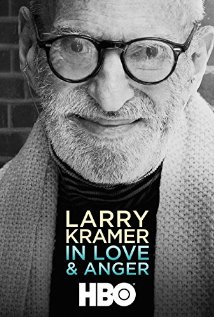
LARRY KRAMER IN LOVE AND ANGER
US, 2015, 82 minutes, Colour and black and white.
Directed by Jean Carlomusto.
This is a documentary well worth seeing.
Larry Kramer, born in 1935, is well-known in the United States as a film writer (Women in Love), a novelist (Faggots) and as a strong activist, co-founder of Act Up, in the cause of AIDS.
The film introduces him, seemingly an extreme strident figure, hammering audiences with the idea that AIDS is a plague that was being ignored, especially by the Reagan Administration and Ed Koch, Mayor of New York. He was to continue this kind of protest, loud demonstration, action in the streets, the giving of talks, television interviews, writing articles and books for several decades.
Perhaps he is best known in theatre and television circles with his play The Normal Heart. This documentary has sequences from the initial performance in the 1980s, from a revival in 2011 and from the television film with Mark Ruffalo as Ned Weeks, the alter ego of Larry Kramer.
The film takes the audience back with photos and commentary to his childhood, the shy boy, feeling isolated as a homosexual, early experiences, in college, with the witness of other students at college and universities at the time and the sense of isolation.
After some time working in the film industry, and this film has the long except of the nude wrestling scene between Oliver Reed and Alan Bates from Women in love, noting how it was a breakthrough sequence in 1970. But, it is pointed out that Larry Kramer works best for himself, not with a group, and he moved out of the film industry and wrote his novel Faggots, which received some favourable views but many hostile reviews, especially from homosexuals.
He went to work in England where he found he was much more accepted and able to develop his craft and his ideas.
One of the strong points from Larry Kramer, all through his career, and subject to strong critique from other gay writers and critics, is his taking a stance against mere sex for sex’s sake, the “meat rack” mentality that he derides, the focus on the physical rather than an exploration of emotions, love, deeper commitment to others. He became much more explicit several years after the release of the novel in 1978 with the spread of AIDS. He is particularly rueful in recent years that with medication to combat AIDS, there has been a return to some hedonistic recklessness in homosexual behaviour.
He became personally involved in the campaign about AIDS in the 1980s, speaking, the production of his play, with a variety of groups – with some of the members find him so exasperating that he was expelled.
Nevertheless, he has continued over the decades, often an abrasive figure, but with a strong message.
In the latter part of the film, he has health complications and is seen in hospital, especially with the director of the film, building up to a marriage ceremony in hospital with his longtime partner, David Webster.
Kramer is an interesting figure in himself, a challenger to the administration – with many scenes and interviews with Anthony Fauci, who headed the government’s drug program, who debated often with Kramer, but also pays tribute to him in pressurising the development of the drugs which ultimately we used to combat AIDS.
Kramer is an interesting figure in the American arts, theatre, and counter-culture.